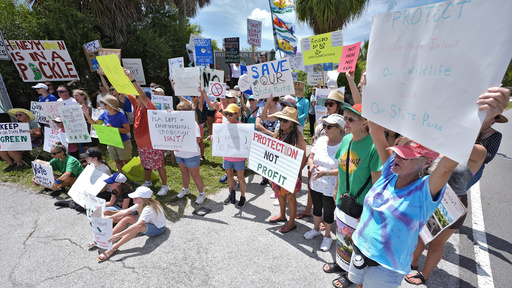Florida state parks may soon be safe from certain types of development, as the state House recently passed a bill prohibiting the construction of facilities like golf courses, pickleball courts, and luxury lodges. The legislative action comes after significant public disapproval of such developments, which were initially promoted by Governor Ron DeSantis’ administration. The measure received unanimous support in the House, passing with a 115-0 vote, and is now advancing to the Senate, where a similar proposal is making its way through committee review.
Support for the bill grew after public protests last year voiced strong opposition to DeSantis’ proposed Great Outdoors Initiative. The public outcry ultimately influenced the governor’s decision to pause the development plans. Proponents of the legislation intend to ensure these kinds of projects cannot arise in the future. “The outcry was loud enough to be heard all the way to the moon or Mars,” remarked Rep. Lindsay Cross, a Democrat from St. Petersburg, who actively participated in the protests. “This bill is important to keep our wild Florida unspoiled by unwanted development.”
While the legislation curtails specific types of development, it does not eliminate all future projects within state parks. It requires that new development focus on “conservation-based recreational uses.” These include activities such as hiking, swimming, horseback riding, and nature study, according to an analysis by House staff. The analysis stresses that any new construction must be executed in a way that protects the parks’ critical habitats and preserves their natural and historical resources.
Last August, the Republican governor’s Department of Environmental Protection disclosed plans for development in nine state parks. They held a mere one-hour public hearing before attempting to proceed with the projects, leading to large-scale protests both in the parks and in the state capital, Tallahassee. Protesters brandished signs with messages like “Save Don’t Pave” and “Parks Over Profit,” drawing hundreds of participants clamoring to protect the parks.
To finalize the legislation, differences between the House and Senate bills must be reconciled. The Senate’s version currently contains what environmental groups describe as a loophole that might still permit golf courses and other developments in certain park areas. “Environmental advocates would prefer more precise language,” said the bill’s primary Senate sponsor, Republican Gayle Harrell. She also noted that time is running short for passage, as the legislative session is set to end by May 2.
Despite these differences, the Senate version has cleared two committees unanimously. Governor DeSantis has yet to publicly state his position on the bill, but it enjoys robust bipartisan support in both legislative chambers. “Our state parks are treasures that showcase the real Florida,” emphasized Democratic Rep. Allison Tant, reflecting sentiments widely shared by her colleagues and the public alike.



